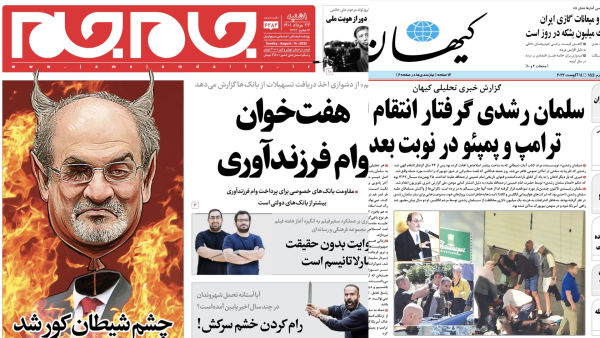More than 30 years of Iran-inspired death threats have resulted in the stabbing of the Indian-born British novelist Salman Rushdie while he was on the stage of a literary event in New York last Friday. Fingers were directed at Iran immediately as its former Supreme Leader Ayatollah Khomeini was the first to call for the killing of Salman Rushdie back in 1989.
Salman Rushdie, 75, has miraculously survived the stabbing attack and his doctors have reported removing him off ventilators and celebrated a few words he was able to utter to reassure his family that he is past the critical condition.

Source: Twitter
Yet, accusations have been pointing at Iran's Islamic Revolutionary Guard Corps IRGC, especially after investigating the attacker, the Lebanese-American Hadi Matar, identified a strong loyalty to Iran's leadership and hinted that he might have been in contact with IRGC leaders.
While Iran has officially denied any involvement in the attack, online people have tracked the Iranian press' response to the stabbing of Salman Rushdie, particularly journalist Khosro Kalbasi who posted a thread on Twitter with photos and translation showing "wide celebrations" of the stabbing that targeted Salman Rushdie.
Salman Rushdie Attack in Iranian Press
1- Keyhan Newspaper - Known as the most conservative newspaper in Iran

Translation by journalist Khosro Kalbasi: "Divine revenge befalls Salman Rushdie, Trump and Pompeo are next"
2- Javan - Linked to Iran's Islamic Revolutionary Guard Corps IRGC
IRGC-linked Javan described attack on Salman Rushdie as "divine retribution", alleged it might be part of a plot to justify "violence against Muslims and Islamophobia", celebrated Rushdie's "blood being splattered on the walls". pic.twitter.com/qqKrBRMthX
— Khosro Kalbasi (@KhosroKalbasi) August 14, 2022
3- Jaam-e Jam
Iran's state broadcaster's daily Jaam-e Jam dedicated its frontpage to the assassination attempt on Salman Rushdie and wrote: "Devil's eye was blinded". pic.twitter.com/rd89Uw0gtw
— Khosro Kalbasi (@KhosroKalbasi) August 14, 2022
Pro-government Iranian newspapers have not supported accusations of official involvement in Salman Rushdie's assassination attempt. However, some media outlets welcomed the attack and hoped the next ones will target US officials namely former US President Donald Trump and former Secretary of State Mike Pompeo, while others blamed it on the failure of US intelligence.
Some Iranian media sources also backed a "conspiracy theory" that suggested the attack on Salman Rushdie was "allowed" and "facilitated" to smear Iran's reputation worldwide.
The former Supreme Leader of Iran, Ayatollah Khomeini, who led the Islamic revolution that has ruled the country since 1979 was the first to issue a religious decree calling for the killing of Salman Rushdie after the Indian-born British novelist published his novel "The Satanic Verses" in 1988, saying it "offends Islam, Muslims, and the Muslim Prophet Mohammad".
Yet, many argued that the strong Iranian reaction to the novel included "indirect satire" mocking the Iranian leader, who is considered a sacred figure by many religious Shia Muslims.









